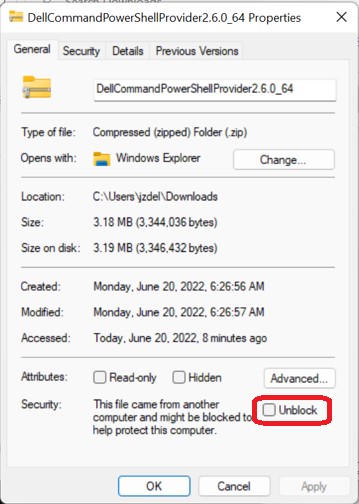Dell Command | PowerShell Provider Does not work properly or cannot import into PowerShell
Resumen: The following article provides information about Dell Command | PowerShell Provider (DellBIOSProvider) not working correctly or importing correctly to Windows PowerShell.
Instrucciones
Affected Products:
Dell Command | Powershell Provider
Affected Operating Systems
Windows 7 or Later
Windows PE 4.0 and Later
- Operating System Types: Windows 7, Windows 8, Windows 8.1, and Windows 10
- Windows Management Framework (WMF): 3.0, 4.0, 5.0, and 5.1
- Windows PowerShell: 3.0, and later (can be upgraded for Windows 7).
- SMBIOS: 2.3, and later on a Dell Product
- Microsoft Visual C++ Redistributable: 2010 or later
Dell Command | PowerShell Provider: A PowerShell module that provides BIOS configuration capabilities for Dell Client computers using the Windows PowerShell Interface. (For example: Such as the OptiPlex, Latitude, Venue 11 Pro, XPS Laptop, and Precision.) This module, with its native configuration capability, makes BIOS configuration most manageable for administrators.
Windows PowerShell: A tool that was intended to be more powerful than the Command Prompt for Windows and is based on the .NET Framework. This tool is intended to help users automate many administration tasks:
- Identifying USB devices that are installed on either one or multiple computers on a network.
- Identify, and kill processes or filter information about computers or their network in a clear HTML format.
- It gives you the ability to create scripts and link commands together.
- More Powerful Ways to Launch Windows PowerShell
Install instructions are in the Dell Command | PowerShell Provider that are located here:
https://www.dell.com/support/home/en-us/product-support/product/command-powershell-provider/docs
Issue: When attempting to import the module with the command: Import-Module DellBIOSProvider -Verbose, the following error is presented:
Import-Module : File C:\Program Files\WindowsPowerShell\Modules\DellBIOSProvider\DellBIOSProvider.psm1 cannot be
loaded because running scripts is disabled on this system. For more information, see about_Execution_Policies at
https:/go.microsoft.com/fwlink/?LinkID=135170.
At line:1 char:1
+ Import-Module DellBIOSProvider -verbose
+ ~~~~~~~~~~~~~~~~~~~~~~~~~~~~~~~~~~~~~~~
+ CategoryInfo : SecurityError: (:) [Import-Module], PSSecurityException
+ FullyQualifiedErrorId : UnauthorizedAccess,Microsoft.PowerShell.Commands.ImportModuleCommand
Resolution: The Set-ExecutionPolicy command was not run. Run the following command:
Set-ExecutionPolicy RemoteSigned -force
Import-Module DellBIOSProvider you may not see any of the relevant error messages and think the import was successful. We recommend you import the module using Import-Module DellBIOSProvider -verbose. This shows every step and error message during the process.
Issue: When attempting to import the module with the command: Import-Module DellBIOSProvider -Verbose, the following error is presented:
Import Module : The specified module 'DellBIOSProvider' was not loaded because no valid module file was found in the module directory.
At line:1 char:1
- Import Module DellBIOSProvider – verbose
Resolution: Be sure the folders from the Dell Command | PowerShell Provider ZIP are copied to the correct location. The module folder by default for the Windows PowerShell is C:\Program Files\WindowsPowerShell\Modules or $[env:ProgramFiles]\WindowsPowerShell\Modules depending on your operating system architecture.
See: Installing Dell Command | PowerShell Provider in the User Guide for more details:
Issue: The following message is shown when running a Dell Command | PowerShell Provider cmdlet:
Do you want to run software from this untrusted publisher?
File C:\Program Files\WindowsPowerShell\Modules\DellBIOSProvider\DellBIOSProvider.psm1 is published by CN=Dell Inc,
SERIALNUMBER=2141541, OU=Client Product Group, OID.2.5.4.15=Private Organization, O=Dell Inc,
OID.1.3.6.1.4.1.311.60.2.1.2=Delaware, OID.1.3.6.1.4.1.311.60.2.1.3=US, L=Round Rock, S=Texas, C=US and is not trusted
on your system. Only run scripts from trusted publishers.
[V] Never run [D] Do not run [R] Run once [A] Always run [?] Help (default is "D"):
Resolution: The module was copied without unblocking the ZIP. Unblock the Dell Command | PowerShell Provider ZIP first in the ZIP properties by checking the Unblock box (circled in red):

Figure 1: (English Only) ZIP Properties Window
Then recopy the Dell Command | PowerShell Provider folder to the right destination.
- 32-bit OS -> DellBIOSProviderX86
- 64-bit OS -> DellBIOSProvider
See: Installing Dell Command | PowerShell Provider in the User Guide for more details:
